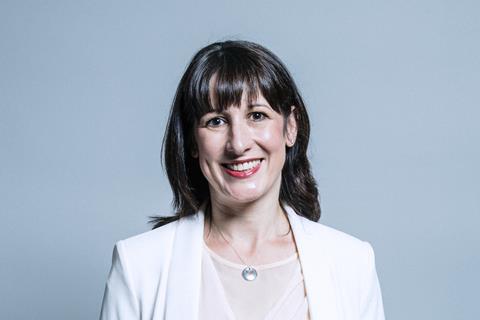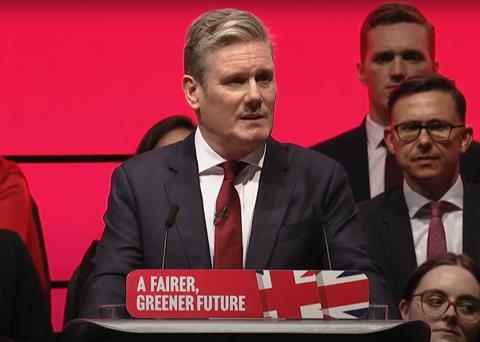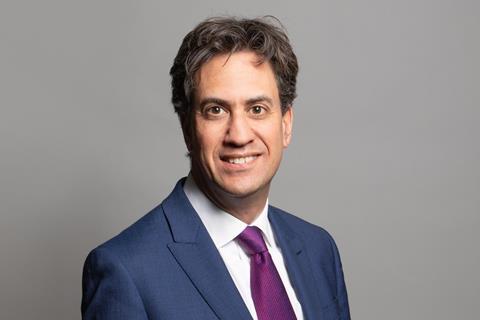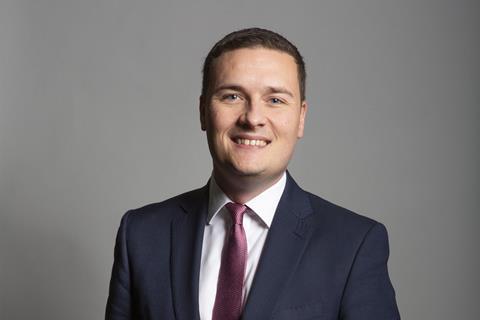As the Conservatives flounder and Labour’s poll numbers soar, we explore the key figures for construction in Keir Starmer’s shadow cabinet along with their key policies
It is safe to say that Liz Truss’ first month in office will go down as one of the most dismal for any prime minister in living memory. The pound has been in freefall, letters of no confidence have reportedly already been submitted by Conservative backbench MPs and last week former secretary of state Nadine Dorries told the prime minister that she should seek a new mandate if she wants to ditch any Johnson-era policies.
The Labour Party, meanwhile, has seen a massive reversal of fortunes since the electoral catastrophe in December 2019 and, two weeks ago, pulled off a relatively drama-free party conference in Liverpool which happened to coincide with the chaotic aftermath of Kwasi Kwarteng’s “mini-Budget”.
The result was a huge boost in the polls, with one YouGov survey giving the party a 33-point lead over the Conservatives, the highest figure the party has ever recorded in any published survey since the 1990s, according to the pollster. So, as voters appear to be taking Labour increasingly seriously as a potential party of government, Building has had a closer look at the key shadow cabinet figures who could support Keir Starmer in a future Labour government

Rachel Reeves, shadow chancellor of the exchequer
A former Bank of England economist, Rachel Reeves was elected to the constituency of Leeds West in 2010 and was a supporter of Ed Miliband in the leadership election of the same year. Miliband made her his shadow chief secretary to the Treasury and subsequently shadow secretary of state for work and pensions, where she made her reputation as a politician willing to outflank the government on traditionally Conservative issues, announcing that Labour would be “tougher” than the Conservatives in cutting benefits.
Reeves was shut out of the shadow cabinet during the Corbyn years and was vocal in her opposition to the leadership. From 2017 to 2020 she was chair of the Commons business select committee, before returning to the frontline in Keir Starmer’s shadow cabinet, first as shadow chancellor of the Duchy of Lancaster, then as shadow chancellor.
In the role, Reeves has attempted to establish Labour as the party of sound money, telling the Financial Times that under Starmer’s leadership the party was “pro-business” and committed to fiscal discipline. “A precondition for doing anything is being trusted with public money,” she told the newspaper, promising to eliminate borrowing for day-to-day spending, while investing heavily with a climate-focused capital spend.
She has also vowed to close tax loopholes exploited by high earners and, in her speech to the Labour conference this year, contrasted the party’s approach with the “trickle-down economics” of Truss and Kwarteng, which she said had been “tried, has been tested and has failed”.
Reeves has promised to set the minimum wage at a rate that reflects the real cost of living and said she would scrap business rates, reforming how businesses pay taxes so they “get valuation discounts straight away rather than waiting for years for their money back”.

Lisa Nandy, shadow secretary of state for levelling up, housing and communities
Having come third in the race which saw Starmer ascend to the Labour leadership, Lisa Nandy is among the best-known figures in the shadow cabinet. The Wigan MP climbed steadily through the party ranks following her election in 2010 and was appointed shadow energy and climate change secretary in 2015 by then-leader Jeremy Corbyn. This was followed by a stint as shadow foreign secretary under Starmer before being moved to the communities brief as Michael Gove’s opposite number.
The role was widely seen as a good fit for Nandy, who had put reversing the decline of left-behind towns at the heart of her leadership bid. In the run-up to the 2019 election, she backed a call for at least 150,000 social rented homes to be built per year, with 100,000 built by councils.
To put this into context, the most recent government figures show that last year 52,100 affordable homes were built in total in England, with just 6,239 built for social rent. Building 150,000 such homes would therefore be a huge increase and it remains to be seen whether Nandy and Labour really think these sort of numbers are achievable.
This will be our mantra. Council housing, council housing, council housing
In her conference speech last month, Nandy said that Labour would restore social housing as the second-largest form of tenure. “This will be our mantra: council housing, council housing, council housing,” she said, echoing Tony Blair’s comments on education more than two decades ago.
“We’re going to rebuild our social housing stock and bring homes back into the ownership of local councils and communities.”
Nandy is also a champion for net zero policy, arguing in 2020 that protecting green spaces and wildlife was a “core part of the socialist tradition”. She clearly sees net zero in part as a tool to aid levelling up and increasing the prosperity of towns, telling the Today programme earlier this month: “The road to net zero is paved with a million climate jobs. These are clean energy jobs that could be going to places like Wigan, to Barnsley, to Aberdeen.”
Key policies to emerge from the Labour conference

Zero carbon power by 2030
The UK’s energy supply would be rapidly transformed under a Labour government, making it 100% generated by renewable sources over the next seven years. The policy, announced in the build up to the conference, is a more ambitious upgrade of Jeremy Corbyn’s pledge in 2017 to have 60% of electricity generated by renewables.
Starmer said in his conference speech that the policy would turn the UK into a “green growth superpower” by doubling onshore wind and tripling solar power. He also wants to quadruple offshore wind, which, given that the UK already has some of the largest offshore windfarms in the world, means a colossal amount of consruction work. These sources would make up around 70% of supply, with the remaining 30% to be generated by tidal, hydrogen and nuclear.
“Driving the plan forward is a goal that would put us ahead of any major economy in the world,” Starmer said, adding it would need to be a “huge national effort” which would get underway within the first 100 days after a general election.
Create a state-owned energy firm
Within its first year in office a Labour government would set up a publicly owned energy company. The policy was another major announcement in Keir Starmer’s speech to the party conference in Liverpool.
“Great British Energy” would work with independent firms, funding green energy projects and looking to boost domestic energy security, with the goal reportedly being to create a firm of comparable size to the French energy giant EDF.
Starmer said the approach was “right for jobs, right for growth and right for energy independence from tyrants like Putin”.
>> Also read: Starmer promises state energy supplier to fund green schemes
>> Also read: Green infrastructure investment centre-stage at conference as Labour poll lead grows
Increase home ownership
Another major element of Starmer’s conference speech was his announced intention to make Labour “the party of homeownership in Britain”, setting a target of 70% home ownership, with a new mortgage guarantee scheme for first buyers to achieve it.
Labour would also give first-time buyers first refusal on new developments in an effort to boost ownership from the current 63% level. Starmer said a Labour government would also reform the planning system, “so speculators can’t stop communities getting shovels in the ground”.

Nationalise the railways
The party restated its commitment – initially made in Corbyn’s 2019 manifesto – to bring UK railways back into public ownership. Shadow transport secretary Louise Haigh said they would be taken into public ownership “when contracts expire”, which means the government would not have to make exit payments.
The move was welcomed by Manuel Cortes, general secretary of the TSSA, who said it made “perfect economic sense”, while industry body Rail Partners said the announcement was “not unexpected but still disappointing”.
Improved conditions for workers
Deputy leader Angela Rayner said the party would introduce a fair work standard for the public sector, guaranteeing fair conditions, job security, wellbeing, proper training, rights at work and union access. Self-employed workers would be given legal rights to a written contract and timely payment under the policy.
The party’s Stronger Together policy review also contained a promise to extend statutory maternity leave and “make sure that families are able to take advantage of it”, as well as a pledge to review the shared parental leave system to incentivise sharing of leave and crack down on maternity and pregnancy discrimination.

Jonathan Reynolds, shadow secretary of state for business and industrial strategy
Stalybridge and Hyde MP Jonathan Reynolds was elected in 2010 and quickly rose through the Labour ranks under then-leader Ed Miliband, who appointed him as shadow minister for energy and climate minister in 2013.
This was followed by spells as shadow rail minister, shadow economic secretary to the Treasury and shadow secretary of state for work and pensions, before his appointment as shadow business secretary in November last year. So Reynolds already has a breadth of policy experience under his belt.
As a native of Tyne and Wear, a major heartland for the party before the 2019 general election wipeout, he is likely to play an important role when the country next goes to the polls as the party attempts to prove to red wall voters that it is not run by a north London clique.
Reynolds is a member of Unite the Union, although he describes himself as a moderate. He supports sector-wide fair pay agreements, where negotiations within a specific industry between employers and worker representatives result in minimum wage rates being set.
He said in his conference speech that the policy would “be to the next Labour government what the national minimum wage was to the last one”.

Ed Miliband, shadow secretary of state for climate change and net zero
The role held by Jacob Rees-Mogg, secretary of state for business, energy and industrial strategy, in government is divided in two in the shadow cabinet. While Reynolds oversees business and industrial strategy, Ed Miliband is the shadow secretary of state for climate change and net zero.
The establishment of separate positions for Miliband and Reynolds could signal an intention to create a separate department for energy and climate change, as existed under the last Labour government, if and when the party returns to power.
Miliband, the former leader of the opposition, is a longstanding and vocal proponent of action to address climate change, having previously served as secretary of state for energy and climate change under Gordon Brown.
In March, he announced a plan for energy sovereignty, which included a £6bn a year investment in retrofitting houses, a doubling of capacity of onshore wind farms by 2030 and of offshore wind farms by 2035 and an end to the delay of new nuclear power plants. This plan was significantly upgraded last month to a quadrupling of offshore wind power by 2030 along with a tripling of solar power.
Miliband has also backed a windfall tax on energy companies and used his conference speech to accuse Rees-Mogg of “climate denialism” and instituting an “energy policy for the 1820s”. He also called for a new national wealth fund to help Britain lead in hydrogen, green steel and wind energy.

Louise Haigh, shadow secretary of state for transport
Now aged 35, Louise Haigh was briefly the youngest Labour MP when elected to represent Sheffield in the 2015 general election. A 2016 study also found the former Unite shop steward and volunteer special constable to be the hardest working MP of the new intake, a work ethic that may have helped with her appointment to Corbyn’s first shadow cabinet, as shadow minister for civil service and digital reform.
She remained in the shadow cabinet in a succession of roles throughout Corbyn’s tenure and into Starmer’s, eventually taking up the transport position in November 2021.
We will build an Elizabeth line for the North and deliver Northern Powerhouse Rail and HS2 in full
In her conference speech this year she accused the Conservative party of letting down the North with false promises to deliver Northern Powerhouse Rail (NPR) in full. “A once-in-a-century chance to invest in public transport, to transform opportunity across the whole country, rebalance our economy, and take millions of cars off the roads, and they flunked it,” she said.
Instead Haigh promised that the Labour Party in government would build “an Elizabeth line for the North” and deliver NPR and HS2 in full.
If Haigh were to become the secretary of state, she would probably be joined in the Department for Transport by Tanmanjeet Dhesi, shadow rail minister. Dhesi recently re-iterated the party’s position in favour of renationalising rail services, telling an RMT union fringe meeting at the Labour Party conference: “We believe that under a Labour government we should be taking rail back into public ownership.”
He has previously said that Starmer would take a “pragmatic” rather than “ideological” approach to nationalisation.

Bridget Phillipson, shadow secretary of state for education
Houghton and Sunderland South MP Bridget Phillipson is another member of Labour’s top team to hail from Tyne and Wear. Appointed shadow education secretary in November last year following an 18-month stint as shadow chief secretary to the Treasury, she is seen as a rising star in the party.
Like Reynolds, she is a valuable asset for Labour as it seeks to retake swathes of the red wall.
Phillipson has announced a string of policies in recent weeks, including reforming the apprenticeship levy by allowing it to be spent on types of training other than apprenticeships, such as skills courses. Up to half of firms’ levy contributions for a renamed “growth and skills levy” could be spent on training to tackle skills gaps, while 50% would be reserved for apprenticeships.
Phillipson said in her conference speech that the existing levy did not allow firms to improve skills and the reforms would “give people opportunities to retrain, to upskill and to learn throughout life”.
Labour’s education team also wants to rebrand the government’s Unit for Future Skills as Skills England, with a brief to “meet the skills needs of the coming decade across all regions, and ensure we can deliver our climate investment pledge.” Phillipson said the new body would “bring together businesses, unions and training providers to work in partnership, leading a national mission to upskill our country”.
Another policy she has up her sleeve is abolishing tax relief for private schools. She said at conference that the money would be used to pay for “the most ambitious school improvement programme for a generation” and will see thousands more teachers employed to “drive up standards everywhere”.
She also wants to “completely transform” childcare by funding before and after-school clubs to give parents more time to work.

Wes Streeting, shadow secretary of state for health and social care
Promoted to the post of shadow health secretary last November, Wes Streeting has prepared a programme of modernisation and investment for the NHS. In June, he wrote to the National Audit Office demanding an inquiry into delays to the new hospital programme.
Streeting, whose own Ilford North constituency is served by Whipps Cross, one of the 40 “new” hospitals that had been promised by former prime minister Boris Johnson, said it was “concerning that rows between government ministers are causing delays to the programme to deliver on the government’s commitment to build 40 new hospitals”.
He added that he was “concerned that unnecessary delays will result in significant waste of taxpayers’ money, given the increase in prices for construction materials in the past year”.
The shadow secretary’s commitment to the building programme is unclear, going unmentioned in his conference speech which instead said that a Labour government would “agree a 10-year plan with the NHS to shift the focus of healthcare out of the hospital and into the community”.


























1 Readers' comment